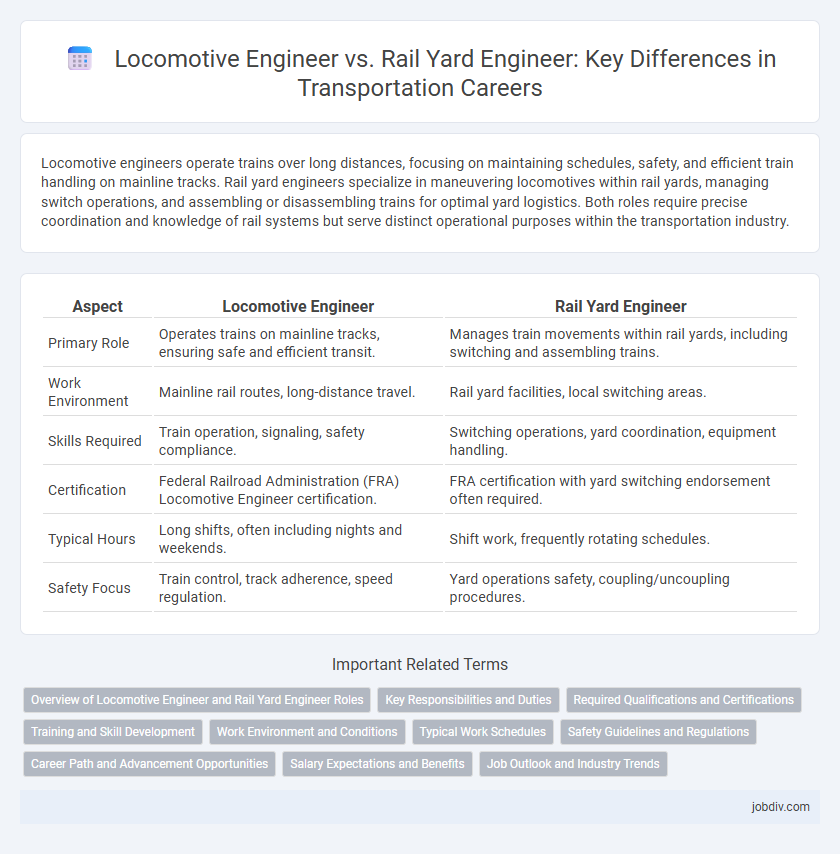Locomotive engineers operate trains over long distances, focusing on maintaining schedules, safety, and efficient train handling on mainline tracks. Rail yard engineers specialize in maneuvering locomotives within rail yards, managing switch operations, and assembling or disassembling trains for optimal yard logistics. Both roles require precise coordination and knowledge of rail systems but serve distinct operational purposes within the transportation industry.
Table of Comparison
| Aspect | Locomotive Engineer | Rail Yard Engineer |
|---|---|---|
| Primary Role | Operates trains on mainline tracks, ensuring safe and efficient transit. | Manages train movements within rail yards, including switching and assembling trains. |
| Work Environment | Mainline rail routes, long-distance travel. | Rail yard facilities, local switching areas. |
| Skills Required | Train operation, signaling, safety compliance. | Switching operations, yard coordination, equipment handling. |
| Certification | Federal Railroad Administration (FRA) Locomotive Engineer certification. | FRA certification with yard switching endorsement often required. |
| Typical Hours | Long shifts, often including nights and weekends. | Shift work, frequently rotating schedules. |
| Safety Focus | Train control, track adherence, speed regulation. | Yard operations safety, coupling/uncoupling procedures. |
Overview of Locomotive Engineer and Rail Yard Engineer Roles
Locomotive Engineers operate trains by controlling speed, braking, and adherence to schedules, ensuring safe and efficient freight or passenger transport. Rail Yard Engineers manage the movement of railcars within switching yards, organizing railcars for assembly, disassembly, and timely dispatch. Both roles demand precision in coordinating train operations but differ in scope, with Locomotive Engineers focusing on train operation across routes and Rail Yard Engineers optimizing railcar arrangements within yards.
Key Responsibilities and Duties
Locomotive Engineers are primarily responsible for operating and controlling trains, ensuring safe and efficient transportation of passengers and cargo across various rail routes. Rail Yard Engineers focus on directing and managing rail yard operations, including switching tracks, assembling and disassembling train cars, and coordinating with dispatchers for smooth yard movement. Both roles require extensive knowledge of safety protocols, mechanical systems, and communication to maintain operational efficiency and security within the rail industry.
Required Qualifications and Certifications
Locomotive engineers typically require a high school diploma or GED, completion of a Federal Railroad Administration (FRA) certified training program, and certification from the FRA, including passing written and skills tests. Rail yard engineers generally need similar foundational qualifications but may focus more on specialized yard operation training and practical experience within rail yard environments. Both roles demand strict adherence to safety regulations and ongoing certification renewals to ensure compliance with railroad industry standards.
Training and Skill Development
Locomotive Engineers require extensive training in operating high-speed trains, mastering advanced signaling systems, and maintaining strict safety protocols to ensure efficient long-distance rail transport. Rail Yard Engineers focus on developing skills in coordinating complex rail yard operations, managing switching procedures, and optimizing train assembly for smooth logistical workflows. Both roles demand continuous professional development in mechanical troubleshooting, regulatory compliance, and communication to adapt to evolving transportation technologies.
Work Environment and Conditions
Locomotive Engineers primarily operate trains on mainlines, enduring extended periods in moving locomotives exposed to varying weather conditions and requiring high alertness for safety. Rail Yard Engineers work within rail yards, handling short-distance locomotive movements, often performing physically demanding tasks in close proximity to heavy equipment and frequent noise exposure. Both roles demand adherence to strict safety protocols, but yard engineers typically face more frequent stops, starts, and multitasking in a congested, slower-paced environment.
Typical Work Schedules
Locomotive engineers typically work long shifts that can extend up to 12 hours, often involving irregular hours, weekends, and overnight runs to accommodate freight or passenger schedules. Rail yard engineers generally follow more consistent schedules within the rail yard environment, usually aligned with standard daytime or evening shifts but may also work weekends to meet operational demands. Both roles require flexibility due to the nature of train operations and safety regulations governing work hours.
Safety Guidelines and Regulations
Locomotive Engineers adhere to strict Federal Railroad Administration (FRA) safety guidelines that mandate regular equipment inspections, compliance with signal systems, and continuous communication to prevent accidents during transit. Rail Yard Engineers follow Occupational Safety and Health Administration (OSHA) regulations emphasizing safe train assembly, proper use of protective gear, and hazard awareness due to frequent proximity to ground operations and heavy machinery. Both roles require adherence to speed limits, track clearance protocols, and emergency response procedures to ensure operational safety and prevent derailments or collisions.
Career Path and Advancement Opportunities
Locomotive Engineers operate trains on mainline tracks, requiring extensive knowledge of train handling, signaling systems, and safety protocols, offering advancement opportunities into roles such as Trainmaster or Transportation Manager. Rail Yard Engineers specialize in maneuvering railcars within rail yards, emphasizing skills in switching operations and yard logistics, with career progression often leading to Yardmaster positions or rail operations supervisory roles. Both career paths emphasize technical expertise and safety compliance but differ in operational environment and advancement trajectories within the rail industry.
Salary Expectations and Benefits
Locomotive engineers typically earn a higher salary, averaging between $65,000 and $85,000 annually, due to their specialized skills in operating trains over long distances. Rail yard engineers, who manage train assembly and sorting within rail yards, generally earn slightly less, with salaries ranging from $50,000 to $70,000 per year. Both positions offer benefits such as health insurance, retirement plans, and paid leave, but locomotive engineers often receive additional incentives due to the demanding nature of their roles.
Job Outlook and Industry Trends
Locomotive engineers face a steady job outlook with a strong demand driven by the consistent need for freight and passenger rail services, emphasizing advanced training in safety protocols and technology integration. Rail yard engineers experience increasing opportunities due to expanding rail infrastructure and automation trends aimed at optimizing yard operations and reducing turnaround times. Industry shifts toward sustainable transportation and smart rail systems further enhance prospects for both roles, requiring continuous skill upgrades and adaptability to emerging technologies.
Locomotive Engineer vs Rail Yard Engineer Infographic

 jobdiv.com
jobdiv.com